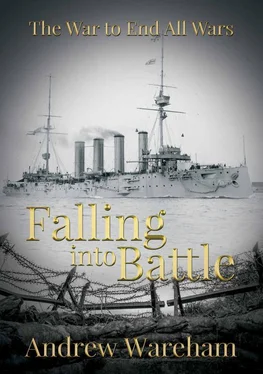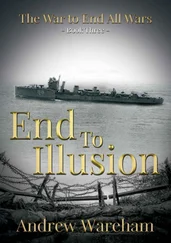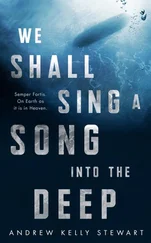“Thank you, sir.”
“Captain will see you in the First Dog. Until then, settle yourself in your quarters and see the Paymaster. Advantage of so big a ship – a cabin you don’t have to share.”
All seemed for the best and Hector looked forward to his future aboard Good Hope .
Christopher Adams had no doubts about his future – his success was a certainty.
He joined the flagship and was welcomed by a cousin who was Commander and expected nothing but the best of him, knowing his record up to date.
“How’s your father, Adams? All well?”
The Viscount was in the best of health, he was happy to reply.
“Excellent! Let me see, you are a navigation specialist, I believe? Guns are for the oily-handed, after all. We will be able to see to your courses in quick time, I do not doubt. You have your certificate, I know. The captain will see you in a few minutes and Admiral Jellicoe will want to make your acquaintance. I’ll send a mid to take you to your cabin and show you round for an hour or two. See you at dinner tonight, old chap.”
Life aboard a destroyer was paradoxically pleasant, Simon decided. There was every rational argument against the existence, yet it was enjoyable. He would not willingly end it, he realised. Captain Ironside must have spotted some maverick trait in him that made him the right sort for small ships – he wondered what it might be that made him revel in the boats.
Life was uncomfortable in port and almost intolerable at sea. It was cold, wet and cramped – and he at least was berthed in the tiny cabins around the wardroom. The men, whose messes were in the forecastle, were up to their ankles in seawater more often than not as she dug into the waves.
The blankets smelled of mould and were normally damp; there was no heating.
Their food was edible but lacked variety and often nutrition. For the wardroom, fried eggs and bacon with bread sliced thick but normally fresh – they were rarely out for two days at a time – was varied with corned beef fritters and fried eggs. When the sea was too high and the steward could not work his frying pan, then it was cold beans from a can with bread and bottled beer. If the stove could be lit then they drank cocoa – pusser’s kye – boiling water poured on a mixture of chocolate powder and brown sugar and undiluted condensed milk with custard powder sprinkled in to thicken the liquid so that it would crawl out of a tilted mug. When possible, a tot of navy rum added flavour. The men probably ate a little better, fed from a galley which could roast and bake as well as fry; even so, boils and other skin conditions were not uncommon among the destroyer men.
It was standard practice for hands and officers alike to dress before leaving harbour in the maximum of wool and waterproofs available, and to undress only after having moored again. They probably smelt but were normally soaked in seawater, so it didn’t notice.
At sea, Simon found himself bearing a hand whenever a job needed doing. On the dreadnought, the officer’s function had been strictly to oversee – to give an order and watch as it was carried out. On the destroyer’s deck the whole party worked together except when leaving and entering harbour, under the eyes of superiors. He lost a fingernail in the first week, flicked off by a bucking cable he was hauling on. His hand was so cold he didn’t notice until he had returned to the wardroom after his watch and it warmed enough to begin to hurt. The nail eventually grew back, thicker and horny, but it made no great difference – he could use the hand perfectly well.
“Joined the club, Sub?”
Dacres raised his left hand, pointed to the cracked and thickened thumbnail.
“That’s how you tell a small ships man – which you are, by the way. Your last captain called you right, young man.”
Simon knew that was true – the hardships were part of the game, the price of freedom. He had never questioned his own espousal of the seafaring life but now he knew that roughing it in a destroyer was far more enjoyable than the almost office-like routine of a battleship.
Dacres laughed at the expressions crossing his face.
“You’ll never be happy away from the boats, unless you choose submarines. Never fancied them, myself.”
Simon shook his head. Going down below the surface was not his idea of fun – the very thought of locking down a hatch and disappearing under the waves made him shudder.
“They only take volunteers – you’ll never be posted against your will to the underwater boats.”
They returned to harbour after the latest training exercise, four boats in line astern, a half flotilla acting under their section leader. They had raced out to the Belgian coast, just outside territorial waters off Ostend, and had made a mock attack on a ferry leaving harbour and had then practised formations, changing from line abreast to echelon to forming pairs and crossing each other from either beam, all at speed. It was good for them, they supposed, but the main effect was to prove that they could not use the fore gun at more than ten knots and that they were limited in visibility for aiming the torpedoes, their own bow wave obscuring their sight.
“Useful targets, the ferries – they’re fast, Sub. Gives an idea of what it would be like to attack a light cruiser.”
“Slowly, at night, I would think, sir.”
“Exactly! Can’t see a bloody thing at speed. Lay up, hove to, well off the bow of a target at night and then let it close to ten cables and pour on the coals and fire from four cables or less and get out in the opposite direction. Might work.”
Most cruisers carried six inch guns and several smaller quick firers besides. At point blank range, eight hundred yards or less, the chance of survival once seen would be small.
“What depth are mines normally set to, sir?”
“About ten feet, so as to do damage to a battleship’s hull below the armour line. Most merchantmen draw at least ten feet.”
“It might be possible, sir, to show ourselves to a bigger ship and then run across a field. We draw eight and half feet, sir.”
“You’re bloody mad, Sub! Find the trough of a wave and we are four feet deeper, or more. Not a good trick!”
“If worst came to worst, sir…”
“You got Japanese blood in you, Sub? Hara kiri and all that, take your enemy down with you in a shower of blood shouting ‘hurrah for Old England’?”
“It was only a thought, sir.”
“Bloody daft thought at that. You can do it if ever me and the captain are killed in action and you are left as the last man on the bridge.”
“I’ll remember that, sir.”
“I had rather you did not!”
Periods of idleness came frequently during the winter when the storms made seagoing impossible. The boats tucked up in harbour and kept a minimum anchor watch aboard and sent their people off on local leave. The destroyers had a tradition already of breaking the official rules which laid down just how many days off a seaman might enjoy in a year.
Simon found himself on the train to London within a fortnight of joining Sheldrake , away for four days with orders to relax and come back ready for a cold month of hard work and poor food. He was well-off, his pay augmented by the hard-lying allowance paid to destroyer men and his quarter’s income sat in the bank. Captain Smallwood had recommended the Dorchester as welcoming to naval officers and being comfortable as well.
“Can’t cook, of course, but neither can anyone in England. You won’t notice anyway. A man who can scoff fried eggs and corned beef like you won’t worry about cordon bleu – or have heard of it.”
Simon had not, did not know what the captain was talking about.
Читать дальше












